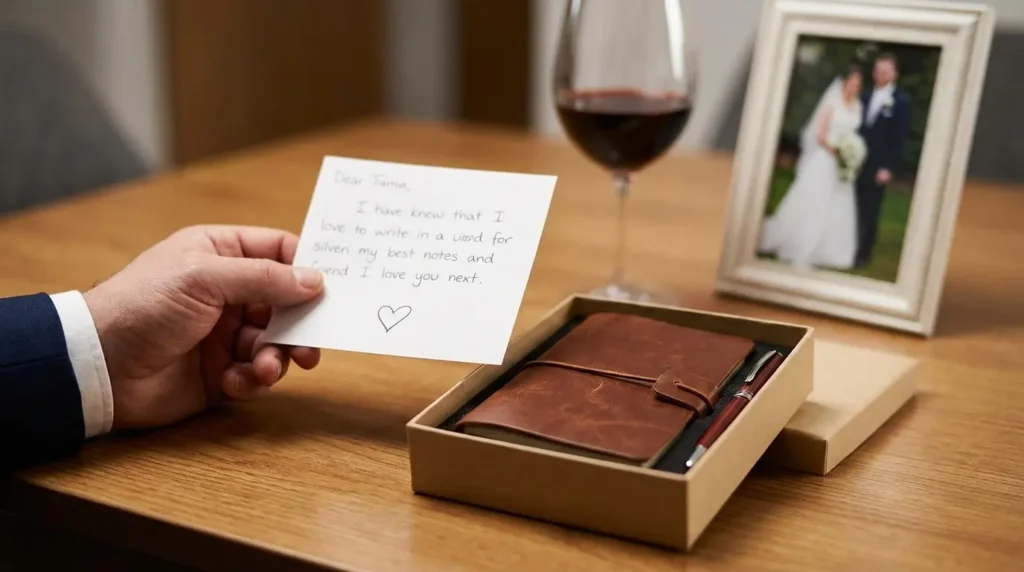Hi, Friend! Jen Glantz here. I’m a bestselling author, the first ever bridesmaid for hire and have helped plan hundred of anniversaries. Let’s dive into a guide on anniversary speeches for husbands.
Let’s be honest: staying married is an achievement. You don’t need a bunch of dry statistics to tell you that keeping a relationship strong takes work, patience, and a sense of humor. But if you look at the numbers, the odds aren’t always in a couple’s favor. That’s exactly why celebrating your anniversary matters. You beat the odds. You’re still standing.
Now the pressure is on. You have to say something. You want to deliver the kind of anniversary speech husbands dream of giving—the kind that doesn’t just get a polite clap, but actually makes her tear up a little (in a good way) and remember why she picked you. This guide is your cheat sheet to turning a simple toast into a memory she’ll keep for the next ten years.
Not sure how to start? Get a strong first draft with our Anniversary Speech Generator.
Quick Resources:
-
Use the Anniversary Speech Generator to craft a heartfelt toast
-
Explore the full suite of planning help in All Wedding Tools
TL;DR
In a rush? Here is the short version on how to nail this thing without boring the room to tears.
- Stop with the “ball and chain” jokes. They aren’t funny; they just make things awkward.
- Focus on the small stuff—the morning coffee, the inside jokes—not just the expensive vacations.
- Give your speech a beginning (who you were before her), a middle (the turning point), and an end (the future).
- Stick to three stories max. Leave them wanting more, not checking their watches.
- Look at your wife, then the room, then back at your wife. Don’t stare at your shoes.
- Write it on note cards. Reading off your phone lights up your face with a weird blue glow.
- If you cry, you cry. Take a breath. It actually makes the speech better.
If you want the deep dive on timing and etiquette, check out our full anniversary speech guide for husbands.
If you want help pulling this all together, try our Anniversary Speech Generator.
Ditch the Sitcom Script
The days of the “bumbling husband” and the “nagging wife” are over. Seriously, retire them. If you want this speech to land, you need to drop the act and be real. Honor the fact that you two have actually built a life together.
Killing the Clichés
If you want people to listen, you have to stop saying the things they expect you to say. You know the jokes I’m talking about. Swap them out for observations that could only come from you.
The “Ball and Chain” Trap
Don’t paint marriage as a trap or your wife as your manager. It might get a cheap chuckle from that one drunk uncle in the back, but it alienates the woman you’re supposed to be toasting. We want humor that connects you, not humor that creates a “me vs. her” vibe. If you need help being funny without being mean, look at some short funny wedding speeches to see how brevity and wit actually work.
The Shift: From “Sitcom” to Sincere
- The “Sitcom” Joke (Don’t do this): “Marriage is a three-ring circus: engagement ring, wedding ring, and suffering. Thanks to Sarah for being the ringmaster.”
- The Real Joke (Do this): “They say marriage is about compromise. For us, that usually means Sarah politely ignoring that I’ve reorganized the dishwasher again, and me pretending I don’t secretly love her reality shows.”
Finding Magic in the Mundane
Grand gestures are cool, but they aren’t what marriage is actually about. Think about “Micro-Moments.” It’s the coffee routine, the look she gives you across a crowded room, the weird inside jokes. Those things paint a better picture of your love than a trip to Hawaii ever could.
Avoid tired jokes and write something real with the Anniversary Speech Generator.
Reading the Room
Remember, you’re talking to your spouse, but everyone else has to listen to it. You have to balance the private stuff with the public setting. Here is how to handle inside jokes so people don’t feel left out.
| The Joke Type | How to Say It | Why It Works |
|---|---|---|
| The Nickname | “I call her ‘The Weather Channel’ because she predicts my mood before I do.” | You explain the backstory so the crowd laughs with you. |
| The Habit | “We have a rule: no talking before the first cup of coffee.” | Everyone relates to this. It’s specific to you, but universal. |
| The Travel Disaster | “We don’t talk about ‘The Paris Incident,’ but let’s just say we finally learned to read a map.” | Hints at a funny story without boring everyone with the details. |
Embracing the Feels
This is where guys usually freeze up. Being vulnerable is the key to a great speech. You don’t have to sob, but you do have to be real.
It’s Okay to Be Messy
Perfection is boring. Admitting that things haven’t always been easy makes the fact that you’re still here mean so much more.
Even celebrities get this right sometimes. Dolly Parton recently made her first public appearance after her husband passed away. She didn’t sugarcoat it. She told her fans, “You know I loved him. Of course, I’m going to always love him… But I wanted you to know that I will always love you.” That raw honesty—acknowledging that love survives the hard stuff—is what makes a tribute powerful.
Digging Deeper Than “She’s Nice”
Don’t just list her resume. Tell us how she affects you. Instead of saying “she’s a great cook,” say “her taking care of dinner is the only thing that grounds me after a crazy day.” Explain the why.
Building a Story, Not a List
A list of adjectives is not a speech. To keep people awake, you need a story. Here is how to build an arc that feels natural.
Turn your memories into a clear story using our Anniversary Speech Generator.
The Story Arc
Think of your speech like a movie. It needs a beginning, a middle, and an end.
Who I Was Before You
Set the scene. Who were you before you met her? Maybe a bit lost? A bit messy? This creates contrast. It shows how much better life is now. Plus, considering the “risk zone” for divorce is often years 1-8, acknowledging that you navigated those early, chaotic years together proves you’ve already passed the hardest test.
The Moment Everything Changed
Pinpoint a moment where you realized, “Okay, this is it. She’s the one.” This is the anchor of your speech.
The Turning Point Example
- The Setup: “We had been dating for six months and it was all fun and games.”
- The Incident: “Then I got laid off. I was panicked. I thought she’d see me as a failure.”
- The Realization: “Instead, she showed up with a pizza and said, ‘Good, now you can start that business you won’t shut up about.’ That was the moment I knew she wasn’t just my girlfriend; she was my partner.”
Where We Are Now
Talk about today. Celebrate the comfort and the stability you’ve built. Kathy Hilton recently posted about her 45th anniversary right after a home invasion, proving that you can stay focused on the positive even when life gets crazy. Use this part of the speech to show that your bond is stronger than whatever life throws at you.
The Smooth Handoff
You need to signal the end so people know when to clap. We’ll cover how to transition into the toast without that awkward “um… so yeah… cheers” moment.
Picking the Right Highlights
You have a million memories. You can only pick a few. Here is how to filter them.
The “Should I Tell This Story?” Checklist
- [ ] Relevance: Does this actually prove my point?
- [ ] Safety: Can Grandma and my boss hear this?
- [ ] Speed: Can I tell it in under 45 seconds?
- [ ] Focus: Does this make my wife look good?
- [ ] Clarity: Do you “have to be there” to get it? (If yes, cut it).
Need help choosing the right moments? The Anniversary Speech Generator can guide you.
The Rule of Three
Pick three stories: one funny, one sweet, and one that shows her character. That’s the sweet spot.
Setting the Scene
Details matter. Don’t just say “that one dinner.” Mention the song that was playing or the terrible weather. It transports people back to that moment with you.
Eyes on the Horizon
An anniversary isn’t just about the past. It’s about what’s next.
Our Next Big Adventure
Talk about the future. Retirement? Travel? Grandkids? Defining your shared goals shows you’re in this for the long haul.
Saying “I Do” Again
You can verbally renew your vows right there in the toast. It’s a classy way to reaffirm your commitment without needing a whole ceremony. If that sparks an idea for a bigger party, check out some vow renewal ideas to make it happen.
One Big Promise
End with a promise for the next year. It grounds the speech in action and leaves a lasting impression.
Owning the Microphone
What you say matters, but how you say it matters more. Here is the physical stuff nobody tells you about.
Speaking Without Words
Your body language screams louder than your voice. Stand tall.
The Triangle Trick
Don’t just stare at your wife the whole time. It gets intense. Use the triangle method.
The Triangle Visualized
Imagine a triangle on the floor.
- Point A (Your Wife): Look here for the “I love you” parts. (50% of the time).
- Point B (Left side of room): Look here when setting up a joke. (25% of the time).
- Point C (Right side of room): Look here for the punchline. (25% of the time).
Silence is Golden
Pause. Seriously. If you say something funny, wait for the laugh. If you say something heavy, let it sink in. Rushing makes you look nervous.
Mastering the Room
Don’t let the tech ruin your moment.
| The Gear | The Mistake | The Fix |
|---|---|---|
| Microphone | Holding it at your belly button. | Keep it at chin-level, about 2 inches from your mouth. |
| Feedback | Standing in front of the speaker. | Step back or to the side. |
| Lighting | Standing with your back to a window. | Face the light so she can see your face. |
| Volume | Talking before the mic is on. | Tap it (don’t blow), wait a second, then go. |
Don’t Eat the Mic
Hold the mic like an ice cream cone you’re about to lick. Chin level. If you drop your hand, your voice disappears.
Finding Your Light
Don’t stand in the shadows. Your wife wants to see your eyes when you say the nice stuff.
Ditch the Phone
Use note cards. Holding a phone lights up your face with a ghostly blue light. It looks bad in photos. Use thick paper or index cards.
The Pre-Game Drink Limit
One drink to loosen up is fine. Three drinks and you’re slurring. Save the heavy partying for after the speech.
When Things Go Off Script
Stuff happens. You might forget a line. You might cry. It’s fine. Here is how to recover.
Saving the Moment
The Brain Freeze Reset
If your mind goes blank, don’t panic. Take a sip of water. Look at your wife. Smile. Take a breath. Nobody knows you forgot a line unless you tell them.
Real Men Cry
If you choke up, stop talking. Just breathe. Let it happen. People love this. It shows you actually care.
The “Emotional Recovery” Script
If you lose it, use one of these lines to get a laugh and reset:
- “I practiced this in the mirror without the waterworks, I swear.”
- “Give me a second—it’s just hitting me how lucky I am.”
- “I promise the rest of this is in English, not just happy tears.”
Dealing with Drunk Uncles
If someone yells something out, smile, acknowledge it briefly (“Thanks, Uncle Bob”), and keep moving. Don’t let them derail you.
Don’t Sweat the Speech Writing
Look, writing something heartfelt is stressful. You have to be charming, emotional, and entertaining all at once. That’s a tall order. This is exactly what we do at Bridesmaid for Hire. We’re famous for helping brides, but we specialize in crisis management and wordsmithing for everyone. If you’re staring at a blank page and panicking, we can help. We offer speech coaching services to make sure you sound like the best version of yourself. You bring the love; we’ll handle the words.
Take the pressure off and write with confidence using the Anniversary Speech Generator.
The Last Word
Your anniversary speech is a chance to freeze time for a second and honor the life you’ve built. Be real, tell a story, and don’t worry about being perfect. Just speak from the heart. If you’re still stuck, reading through some anniversary speech examples might spark the idea you need.
And hey, if you’ve made it this far, congrats. Reaching a milestone means you’ve entered the “Mature Love Stage.” That’s the good stuff. Whether it’s year 1 or year 30, enjoy the moment. You earned it. and nothing else
1-800-BRIDESMAID
The Newlywed
Card Game
something extra to love
Read the weekly newsletter from Bridesmaid for Hire, 1-800-Bridesmaid, to hear about real stories, from strangers, who need advice on love, life, friendship, and so much more.
Looking for the perfect wedding gift for someone you adore? Grab The Newlywed Card Game. It's a fun and interactive game they can play on their honeymoon or future date nights.













